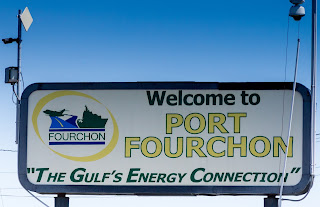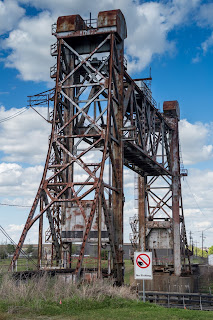SATURDAY (March 28):
We headed south out of New Orleans, gradually extending our
penetration into the Mississippi River Delta all the way to Port
Fourchon. It was an interesting, but general non-photogenic trip.
To get there we drove
next to Bayou Lafourche, seeing surprisingly large boats given its narrow width. At one point we stopped at a small nature park and walked a short distance into the swamp.
The last part of the drive to Port Fourchon was on a bridge about 8
miles long that was high enough to provide a great overview of the area.
Other than an impressive array of anything and everything related to offshore oil drilling and production, there was not much in Fort Fourchon except Marlin’s Restaurant and Motel. The restaurant is open 24-hours a day and the motel rooms likely rent by the hour. We had a good meal at the lunch counter, then headed back over what we now knew was the beginning of the Gateway to the Gulf Expressway: Billy Tauzin Energy Corridor.
Other than an impressive array of anything and everything related to offshore oil drilling and production, there was not much in Fort Fourchon except Marlin’s Restaurant and Motel. The restaurant is open 24-hours a day and the motel rooms likely rent by the hour. We had a good meal at the lunch counter, then headed back over what we now knew was the beginning of the Gateway to the Gulf Expressway: Billy Tauzin Energy Corridor.
After driving a long way back crisscrossing over Bayou Fourche, when we had the chance we opted to get onto a faster route. It was more
efficient in terms of speed, but less interesting. When our route rejoined
the bayou it had shrunk in size and was no longer navigable. It was too stagnant to
be safe for any activity involving direct contact with the water.
We eventually arrived in White Castle, LA and the Nottoway Plantation where
we would be spending the next two nights.
We relaxed on our porch, had a pleasant dinner and went to bed, quickly
getting used to the periodic locomotive horns repeatedly blowing for a series
of road crossings not too far away.
SUNDAY (March 29):
After a good breakfast that included biscuits and grits, we
toured the plantation house. It was one
of the biggest ever build in the south.
It was completed in 1859 and survived the Civil War. Ceiling were 17 feet high, doors, 11 feet
high and the house with outbuildings measuring over 50,000 square feet. Floor-to-ceiling windows could be raised to
serve as doors onto porches. It was
impressive.
After the tours were done for the day, guests staying at the
plantation could wander around it unescorted. Pam
& I went going through one of the windoors (window doors) to sit one the
second floor balcony from which we could see over the levy and so watch the
marine traffic on the Mississippi River.
We then adjourned to the dining room for another good dinner.
We then adjourned to the dining room for another good dinner.






























No comments:
Post a Comment